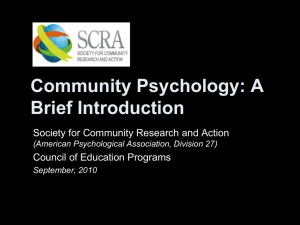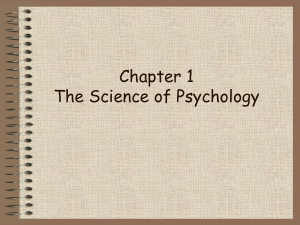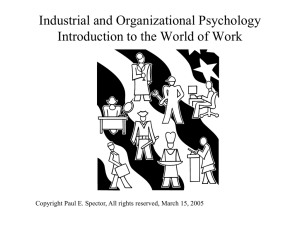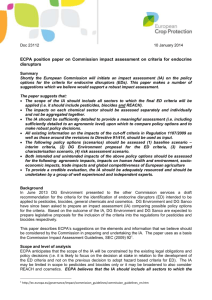more
advertisement
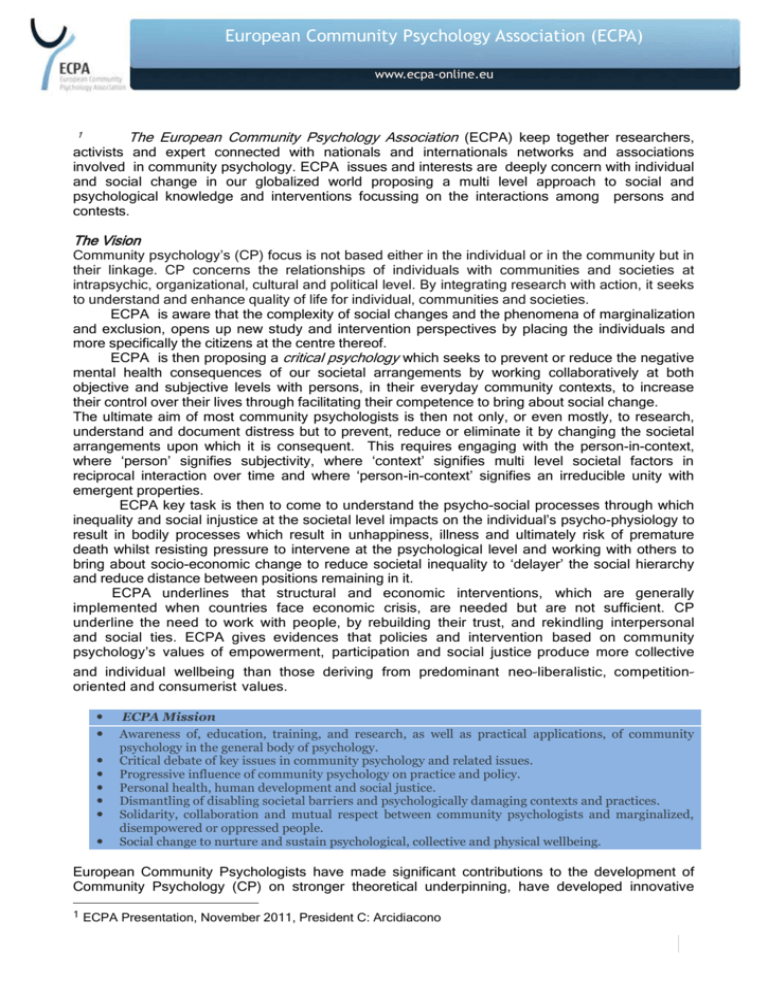
European Community Psychology Association (ECPA) www.ecpa-online.eu The European Community Psychology Association (ECPA) keep together researchers, activists and expert connected with nationals and internationals networks and associations involved in community psychology. ECPA issues and interests are deeply concern with individual and social change in our globalized world proposing a multi level approach to social and psychological knowledge and interventions focussing on the interactions among persons and contests. 1 The Vision Community psychology’s (CP) focus is not based either in the individual or in the community but in their linkage. CP concerns the relationships of individuals with communities and societies at intrapsychic, organizational, cultural and political level. By integrating research with action, it seeks to understand and enhance quality of life for individual, communities and societies. ECPA is aware that the complexity of social changes and the phenomena of marginalization and exclusion, opens up new study and intervention perspectives by placing the individuals and more specifically the citizens at the centre thereof. ECPA is then proposing a critical psychology which seeks to prevent or reduce the negative mental health consequences of our societal arrangements by working collaboratively at both objective and subjective levels with persons, in their everyday community contexts, to increase their control over their lives through facilitating their competence to bring about social change. The ultimate aim of most community psychologists is then not only, or even mostly, to research, understand and document distress but to prevent, reduce or eliminate it by changing the societal arrangements upon which it is consequent. This requires engaging with the person-in-context, where ‘person’ signifies subjectivity, where ‘context’ signifies multi level societal factors in reciprocal interaction over time and where ‘person-in-context’ signifies an irreducible unity with emergent properties. ECPA key task is then to come to understand the psycho-social processes through which inequality and social injustice at the societal level impacts on the individual’s psycho-physiology to result in bodily processes which result in unhappiness, illness and ultimately risk of premature death whilst resisting pressure to intervene at the psychological level and working with others to bring about socio-economic change to reduce societal inequality to ‘delayer’ the social hierarchy and reduce distance between positions remaining in it. ECPA underlines that structural and economic interventions, which are generally implemented when countries face economic crisis, are needed but are not sufficient. CP underline the need to work with people, by rebuilding their trust, and rekindling interpersonal and social ties. ECPA gives evidences that policies and intervention based on community psychology’s values of empowerment, participation and social justice produce more collective and individual wellbeing than those deriving from predominant neo--‐liberalistic, competition--‐ oriented and consumerist values. ECPA Mission Awareness of, education, training, and research, as well as practical applications, of community psychology in the general body of psychology. Critical debate of key issues in community psychology and related issues. Progressive influence of community psychology on practice and policy. Personal health, human development and social justice. Dismantling of disabling societal barriers and psychologically damaging contexts and practices. Solidarity, collaboration and mutual respect between community psychologists and marginalized, disempowered or oppressed people. Social change to nurture and sustain psychological, collective and physical wellbeing. European Community Psychologists have made significant contributions to the development of Community Psychology (CP) on stronger theoretical underpinning, have developed innovative 1 ECPA Presentation, November 2011, President C: Arcidiacono theory driven intervention strategies to promote multilevel empowerment and achieved a high level of networking creating in 1996 ENCP and then the European Community Psychology Association (ECPA), recently member of EFPA (European Federation of Psychologists’ Association). ECPA however, need to provide compelling evidence that community psychologists have the competencies to tackle (with other professionals) today’s complex problems. ECPA Goals and Instruments ECPA goals are strongly concern with social transformations and active participation of citizen to their individual, relational and social wellbeing: 1. CPs work collaboratively to strengthen system, provide cost-effective service, increase access to resources and optimize quality for individuals, private and governmental organizations, corporations and community groups. 2. CPs build on existing strengths of people, organisations and communities to create sustainable change, promoting self- help groups and empowering existing NGO’s and non profit organisations. 3. CPs develop and disseminate strategies such as empowerment training and affective education for individuals and groups and multidimensional organisational analysis to promote empowering organisational contexts. 4. CPs use the dynamics of empowerment in order to enhance well being and growth in individuals and contexts, linking individuals with groups and organisations. 5. CPs are doing and teaching PAR (Participatory- Action –Research) to identify strengths and problem areas of a local community in an intercultural and ecological perspective; are focusing on specific tools as need analysis, community profiling, ethnographical and participative observation, focalized and narrative interviews, visual methods. 6. CPs to promote civic participation and to promote broadly networked community are aware in team and network building, collective problem solving, future labs, mediation strategies for handling conflicts among family members and social groups. 7. CPs promote and support both conventional and new forms of civic and political participation, as well as self--‐help groups using reflexivity, participative methods, so as qualitative and quantitative methodologies. When moving from individuals to groups, organisations and communities CP integrate clinical and community psychology. Self destructive behaviour presents itself in various settings and with various intentions and degrees of seriousness and Community Psychology (CP) can also provide Suicide Prevention Programmes learning from the prevention of violence and accidents; by combining strategic efforts with psychological interventions, community psychologists can assist local services in preventing suicides and dealing with violence and children abuse. In our globalized world ECPA will be a knowledge instrument for the de-ideologization, deconstruction and decolonization of psychology contributing to a critical approach in human sciences. In this sense its specific perspective is to move on from individualistic and psychologistic levels of analysis and intervention and acritical collusion with oppressive ways of thinking and acting in psychology. ECPA final aims are to bond CP more with associations, social, educational, clinical and intercultural psychologists, social workers, with family psychotherapists working with migrant families, interested in overcoming increasing gender, age and cultural divides, and also with work and organisational psychologists who are involved in retraining unemployed persons and dealing with continuous organisational changes. Main Address European Community Psychology Association Grasmarkt 105 / 18, B 1000 Brussels, Belgium President: prof.Serdar M. Degirmencioglu (TR ) Treasurer: Nicholas Carr (No) Past President: prof. Caterina Arcidiacono (11-13); President elect . Liz Cunningham (1517). The Executive Committee prof. Maria João Pereira Vargas-Moniz (PT,) Prof. Bruna Zani (I) Ruben Carrasco (Sp.) TYPE THE DOCUMENT TITLE

